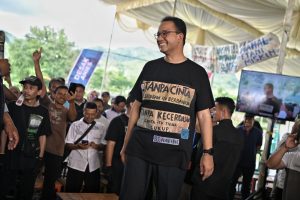After reviewing the foreign policy platforms of two of Indonesia’s three presidential candidates, Prabowo Subianto and Ganjar Pranowo, this article will extend this analysis to the third and final candidate, Anies Baswedan. Since announcing his candidacy in September 2023, this former governor of Jakarta has run with a narrative of “change,” and has opposed many of President Joko “Jokowi” Widodo’s policies.
Anies is arguably knowledgeable in international affairs, considering his educational background and experience during his Jakarta’s gubernatorial term. During his leadership in Jakarta, he was involved in many international events, from hosting the Urban 20 Mayor Summit to speaking at the Milken Institute Global Conference. He has actively presented his ideas during dialogues, hosted by CSIS, FPCI, and AMCHAM with an emphasis on Indonesia’s foreign policy. But it is definitely not enough to conclude that his stance is more acceptable with Indonesia’s reality today.
His campaign manifesto proposes to create an “Indonesia fair and prosperous for all,” signaling the importance of economic equality. He argues that the fruits of Indonesia’s economic development have been unequally distributed. Under their campaign slogan “One Prosperity,” Anies and his vice-presidential running-mate, Muhaimin Iskandar, have brought an almost socialist perspective to the Indonesian policy debate.
So, how does this perspective factor into their stance on foreign policy?
Of the eight main “visions” contained in their election manifesto, which they collectively term the “Road to Change,” one is related to international affairs. According to this section, an Anies administration will seek to “strengthen the national defense and security system, and elevate Indonesia’s role and leadership at the global level to realize our national interest and global peace.”
This section of Anies’ manifesto is quite comprehensive, covering many more issues than those of the other two candidates. The first issue mentioned is “economic diplomacy,” which also apparently seems to be their priority, as it was with Jokowi. Anies plans to promote not only free trade but “fair trade” agreements and also enhance Indonesia’s partnerships at the regional and multilateral levels. The OECD, G-20, APEC, and ASEAN Economic Community are all mentioned as targets of expanded Indonesian participation.
Anies also puts importance on energy security for Indonesia and expresses a desire to create new partnerships with non-traditional partners in Africa, Eastern Europe, and Latin America. In particular, this policy is aimed at reducing and diversifying Indonesia’s sources of energy in a bid to reduce its dependency.
During Anies’ conversation at the Conference on Indonesian Foreign Policy hosted by the Foreign Policy Community of Indonesia in early December, he voiced some criticisms towards Jokowi’s approach to international affairs. In discussing the implementation of Indonesia’s “free and active” foreign policy principle, he mentioned that “Indonesia’s activism should be coming from the head of state,” implying that Jokowi lacked interest and knowledge in foreign policy.
This comes to the first contrast, whereby Anies brings up the essence of promoting values in Indonesia’s foreign engagements, instead of adopting a policy of pragmatism. He argued that pragmatism will trap the nation into strategic limitation and prevent it from acting independently. He said that Jokowi’s economic diplomacy, which is highly based on numbers is at fundamental risk of losing values and norms, without explicitly elaborating on them.
Pragmatically, he added that “Indonesia must act as the balancing power to prevent any power’s domination” in Southeast Asia. Furthermore, given the country’s strategic position, Anies also proposed that Indonesia should act “as the bridger to global connectivity initiatives, particularly in the Indo-Pacific region.”
The manifesto also pledges “balance” in Indonesia’s participation in a range of economic initiatives, including China’s Belt and Road Initiative, BRICS, and the World Trade Organization. The word choice of “balancing” sparked a question of how Anies’ leadership will seek to redress the imbalances in Indonesia’s foreign policy.
Also during the same session, which was attended by government officials, diplomats, academics, and students, Anies proposed a concept of “proactive and inclusive diplomacy.” This referred to an effort to increase those who have a say in the foreign policy-making process, though he did not provide any details of how he would execute it.
With a similar context, during the first presidential debate on December 12, 2023, Anies criticized Jokowi’s non-inclusive decision-making style, particularly regarding the transfer of the country’s capital from Jakarta to the planned city of Nusantara in Kalimantan. His campaign is now promising to shelve the new capital project, arguing that it is exceedingly expensive and should not be a priority for Indonesia.
Anies has also promised to boost Indonesia’s soft power through culinary diplomacy, sports, student exchanges, cultural exhibitions, humanitarian work, and inclusive tourism. In a presumed attempt to compete with Ganjar Pranowo’s “Made in Indonesia” policy, Anies has promoted the “Brand of Indonesia,” with the justification that many foreign products are manufactured in Indonesia, but not by Indonesian firms. Changing this, he argues, will require a greater investment of time and money by the government.

































